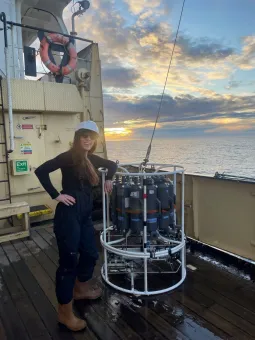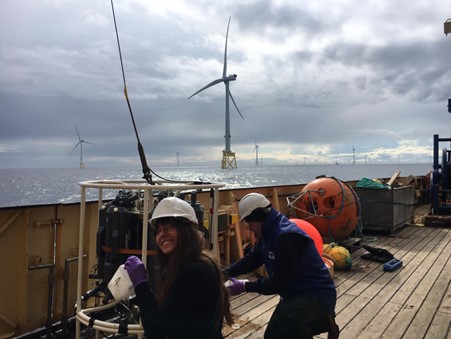
Shelf seas, the shallow seas closest to our continents, account for over 90% of global fisheries productivity, and are relied upon by society for transport and leisure. More recently shelf seas are increasingly being looked at as a renewable energy source to help mitigate climate change.
For this month’s scientist spotlight, we caught up with Physical Oceanographer Dr Charlotte Williams on her fascinating role in using ocean robots to understand the health of our shelf seas.
What is your role in research at the NOC?
I am a physical oceanographer at NOC based at the Liverpool site and work within the Coastal Ocean Processes Group. My research is focused on understanding how physical changes to the coastal and shelf sea environment (through things like wind and tidal driven mixing) impact nutrient and oxygen distribution, and how in turn this might impact small marine plants called phytoplankton.
The distribution of nutrients and oxygen also inform us about how ‘healthy’ our coastal and shelf seas are, so it is important that we measure them to understand how physical oceanography effects their dispersal. In my research I rely heavily on NOC’s fleet of Autonomous Underwater Vehicles (AUV) called gliders to help me investigate this, using exciting technology and sensors to measure turbulence, oxygen and nutrients.

What drew you to working in this area?
After completing my MSc in Applied Physical Oceanography at Bangor University in 2009 I was very keen to carry out a multidisciplinary PhD that linked marine physics through to the biology and chemistry of the ocean. I came to Liverpool to complete a PhD in 2014 with the University of Liverpool and NOC looking at how wind driven mixing affected the supply of nutrients to phytoplankton in the shelf sea.
I enjoy carrying out observational science and was particularly excited about working for NOC and our fantastic fleet of AUVs in order to study the physics and bio-chemistry of the ocean. I have been lucky enough to work closely with the Marine Autonomous and Robotic Systems (MARS) team during my time at NOC and have been involved in deploying 30+ gliders in the Celtic and North Seas as part of a large range of exciting projects.
What science are you currently working on?
I am currently working on the following projects:
PELAgIO (Physics-to-Ecosystem Level Assessment of Impacts of Offshore Windfarms): The PELAgIO project, which is investigating the impact of offshore wind farms on mixing and stratification and how this links through to phytoplankton, small fish and marine birds.
FOCUS (Future states Of the global Coastal ocean: Understanding for Solutions | National Oceanography Centre (noc.ac.uk)) : The aim of FOCUS is to develop global understanding of the impacts of climate change and direct human activities on the coastal ocean at the regional to local scale of human interaction. Across the project objectives we will advance understanding of solutions towards resilience, adaptation, and mitigation of global change in the coastal ocean environment.
HECLA: The Royal Navy HECLA project is working with NOC to use gliders in the seas west of Scotland to test how they might assist in finding submarines. The intention is for the navy to eventually deploy gliders continually to high-threat areas to give a clear and constant picture of the underwater battlespace, meaning operational decisions will be based on the very latest information (Royal Navy trials underwater gliders that can aid submarine hunters (mod.uk)). I am the NOC scientist advising in these glider missions.
GROOM II (Gliders for Research, Ocean Observation and Management, Infrastructure and Innovation): GROOM II is a large EU project which will provide the European Research Infrastructure harnessing the advantages of Marine Autonomous Systems (MAS), in order to provide high-quality ocean observation data and services for the benefit of society, enabling scientific excellence and moving towards net-zero activities. I am a co-leader on WP4 in GROOM II, which is focused on GROOM Research Infrastructure Integration and contribution to sustained observing efforts, particularly related to marine monitoring in EU seas.
What is your favourite thing about the work you do?
I love the variety of all the projects that I am working on, as well as working with the latest cutting-edge technology in ocean observing, there is always something new to learn! I have also been really lucky to work with both scientists and engineers from different groups across NOC, I think for me that is one of my favourite things about my job here, working with such a diverse group of interesting and innovative (and friendly!) people. I also feel like the work I am doing every day is making a difference, and I try to make time to participate in outreach work to communicate the NOC’s science to the public.
What impact does your science have on society?
Shelf seas support more than 90% of global fisheries, and the UK shelf sea alone is worth ~£40 billion. Climate change is causing the ocean to heat up, lose oxygen and become more acidic, and with our shelf seas also increasingly being looked towards as a renewable energy source to help mitigate climate change we need to do all we can to manage them effectively.
The research I conduct not only increases our understanding of how our shelf seas function, but also provides evidence on the health of seas that can be used to inform marine policy and management. Additionally, my work has demonstrated how we can use AUVs to monitor the health and productivity of our coastal and shelf seas (e.g., AlterEco | Alternative framework for assessing shelf-sea ecosystems).
More from Dr Charlotte Williams
Watch: Into the Blue Podcast
Join the NOC Ocean Alliance
If you or your organisation would like to find out more about supporting our endeavours, contact us at giving@noc.ac.uk A gift allows you to have a direct impact on world leading ocean research and innovation, and helps ensure NOC continues to make global impact from the coast to the deepest ocean. Whatever your passion – combating climate change, conserving and protecting ocean life, or equipping the next generation of marine scientists, you can donate here.